Related Research Articles
Nawab is a royal title indicating a ruler, often of a South Asian state, in many ways comparable to the western title of Prince. The relationship of a Nawab to the Emperor of India has been compared to that of the Kings of Saxony to the German Emperor. In earlier times the title was ratified and bestowed by the reigning Mughal emperor to semi-autonomous Muslim rulers of subdivisions or princely states in the Indian subcontinent loyal to the Mughal Empire, for example the Nawabs of Bengal.

Qudsia Begum was a wife of Mughal emperor Muhammad Shah and mother of emperor Ahmad Shah Bahadur. She was early born an administrator and served as de facto regent from 1748 to 1754.
The three Round Table Conferences of 1930–1932 were a series of peace conferences, organized by the British Government and Indian political personalities to discuss constitutional reforms in India. These started in November 1930 and ended in December 1932. They were conducted as per the recommendation of Muhammad Ali Jinnah to Viceroy Lord Irwin and Prime Minister Ramsay MacDonald, and by the report submitted by the Simon Commission in May 1930. Demands for Swaraj or self-rule in India had been growing increasingly strong. B. R. Ambedkar, Jinnah, Sir Tej Bahadur Sapru, V. S. Srinivasa Sastri, Sir Muhammad Zafrulla Khan, K. T. Paul and Mirabehn were key participants from India. By the 1930s, many British politicians believed that India needed to move towards dominion status. However, there were significant disagreements between the Indian and the British political parties that the Conferences would not resolve. The key topic was about constitution and India which was mainly discussed in that conference. There were three Round Table Conferences from 1930 to 1932.
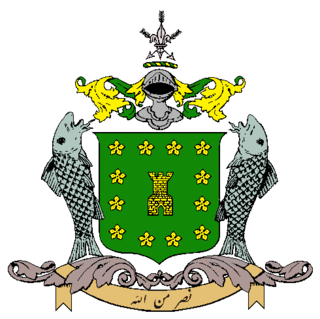
The Nawabs of Bhopal were the Muslim rulers of Bhopal, now part of Madhya Pradesh, India. The nawabs first ruled under the Mughal Empire from 1707 to 1737, under the Maratha Confederacy from 1737 to 1818, then under British rule from 1818 to 1947, and independently thereafter until it was acceded to the Union of India in 1949. The female nawabs of Bhopal held the title Nawab Begum of Bhopal.
Shahjahan Begum was the Nawab Begum of Bhopal for two periods: 1844–60, and secondly during 1868–1901.

From a historical perspective, Professor Ishtiaq Ahmed of the University of Stockholm and Professor Shamsul Islam of the University of Delhi classified the Muslims of Colonial India into two categories during the era of the Indian independence movement: nationalist Muslims and Muslim nationalists. The All India Azad Muslim Conference represented nationalist Muslims, while the All-India Muslim League represented the Muslim nationalists. One such popular debate was the Madani–Iqbal debate.

Bhopal State was founded by Maharaja of Parmar Rajputs. In the beginning of 18th-century, Bhopal State was converted into an Islamic principality, in the invasion of the Afghan Mughal noble Dost Muhammad Khan. It was a tributary state within the Maratha Confederacy during 18th century (1737–1818), a princely salute state with 19-gun salute in a subsidiary alliance with British India from 1818 to 1947, and an independent state from 1947 to 1949. Islamnagar was founded and served as the State's first capital, which was later shifted to the city of Bhopal.
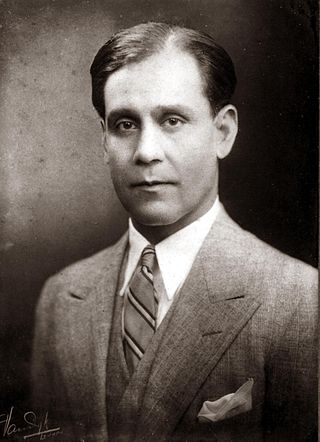
Hamidullah Khan was the last ruling Nawab of the princely salute state of Bhopal. He ruled from 1926 when his mother, Begum Kaikhusrau Jahan Begum, abdicated in his favor, until 1949 and held the honorific title until his death in 1960. A delegate to the Round Table Conference in London, he served as Chancellor of the Chamber of Princes from 1944 to 1947, when India became independent.

Sultan Jahan was the ruling Begum of Bhopal between 1901 and 1926.

The Sachin State was a princely state belonging to the Surat Agency, former Khandesh Agency, of the Bombay Presidency during the era of the British Raj. Its capital was in Sachin, the southernmost town of present-day Surat district of Gujarat State.
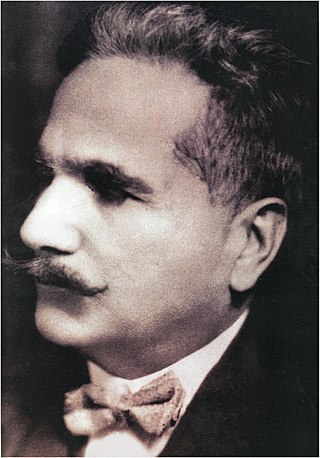
Sir Muhammad Iqbal was a South Asian Islamic philosopher, poet and politician. His poetry is considered to be among the greatest of the 20th century, and his vision of a cultural and political ideal for the Muslims of British-ruled India is widely regarded as having animated the impulse for the Pakistan Movement. He is commonly referred to by the honourific Allama and widely considered one of the most important and influential Muslim thinkers and Western religious philosophers of the 20th century.

Loharu State was one of the princely states of India during the period of the British Raj. It was part of the Punjab States Agency and was a nine-gun salute state.

The Kingdom of Awadh was a Mughal subah, then an independent kingdom, and lastly a princely state in the Awadh region of North India until its annexation by the British in 1856. The name Oudh, now obsolete, was once the anglicized name of the state, also written historically as Oudhe.

Janjira State was a princely state in India during the British Raj. It was governed by the Siddi Khan dynasty of Habesha descent and the state was under the suzerainty of the Bombay Presidency.

Asaf Ali Asghar Fyzee was an Indian educator, jurist, author, diplomat, and Islamic scholar who is considered one of leading pioneers of modern Ismaili studies. He also served as India's second ambassador to Egypt from 1949 to 1952, and Vice-Chancellor of the University of Jammu and Kashmir from 1957 to 1960.
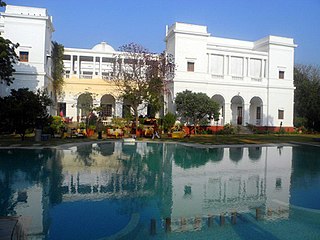
The Pataudi family is an Indian show business family, primarily working in India's Hindi film industry, commonly known as 'Bollywood'.
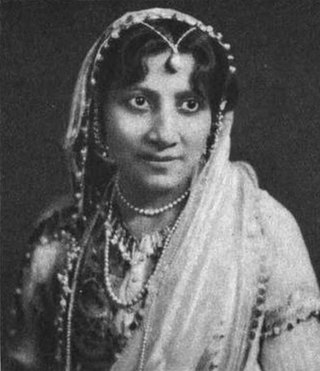
Atiya Fyzee was an Indian author and the first woman from South Asia to attend the University of Cambridge.
The Tyabji family, also known as Tyabji-Hydari,Tyabji-Fyzee, and Tyabji-Futehally family, consists of Mullah Tyab Ali and his descendants. The Tyabji family has gained prestige for its involvement in India's independence movement with individuals being prominent politicians, diplomats, academics, scientists, activists, and athletes. Other members gained prominence for their roles in India's Navy and Air Force and contribution to Indian film and fine art. Individuals within the Tyabji family belong to the Indian royal families of the Nizam of Hyderabad, the Nawab of Bengal, Raja of Wanaparthy, and the Nawab of Janjira.
Samuel Fyzee-Rahamin was an Indian painter and artist who is known as one of the founders of modern Indian painting. One of the first Indians to study at the Royal Academy of Arts in London, he rejected his western academic training to paint in a distinctly Indian style, inspired by traditional Rajasthani paintings and Mughal miniatures. He married Atiya Begum, a pioneering Muslim intellectual and feminist with whom he also collaborated creatively. Globally acclaimed by the 1920s, his most significant work was the frescoes he did on the Imperial Secretariat in New Delhi towards the end of the 1920s. Following the Partition of India, he emigrated to Pakistan with his wife where he died in poverty in Karachi in 1964.
Zehra Fyzee (1866–1940) was a writer, playwriter and editor working in India in the early part of the twentieth century. She was a leading contributor to Urdu women's journals of the time.
References
- 1 2 The Curious Tale of Nazli Raffiya, The Free Press Journal, 3 March 2013.
- ↑ Zafar Anjum (2014). Iqbal: The Life of a Poet, Philosopher and Politician. Random House India. p. 91. ISBN 978-81-8400-656-8.
- ↑ Contemporary Review 105 (1914), p.335
- ↑ Lambert-Hurley, Siobhan (24 January 2007). Muslim Women, Reform and Princely Patronage: Nawab Sultan Jahan Begam of Bhopal. Routledge. p. 158. ISBN 978-1-134-14347-4.
- ↑ Rajan Mahan (1999). Women in Indian National Congress, 1921-1931. Rawat Publications. p. 171. ISBN 978-81-7033-537-5.
- ↑ Atiya Begum (2011). Ra'ūf Pārekh (ed.). Iqbal. Oxford University Press. p. 112. ISBN 978-0-19-547714-6.